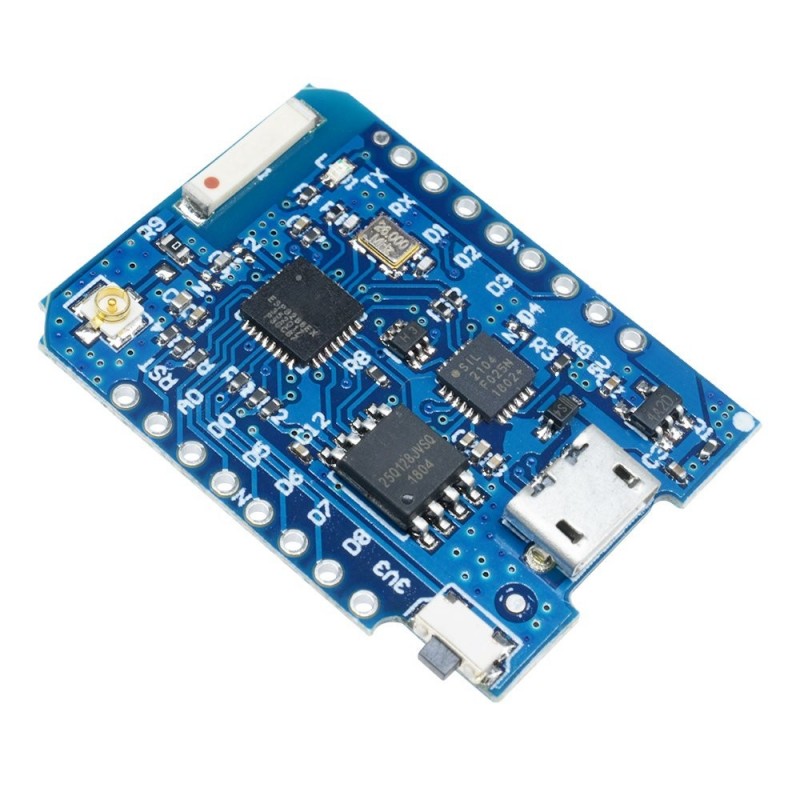




zł20.90 tax excl.
Development board D1 Mini Pro with WiFi ESP8266 module and 16 MB Flash memory, equipped with ceramic antenna and external antenna connector. The module can be programmed from the Arduino IDE level. WeMos D1 Mini Pro
The development board allows you to integrate Wi-Fi module (ESP8266), known for its simplicity of use and considerable capabilities in projects requiring network access, eg within IoT. The module has 11 digital I / O pins with interrupt, PWM, I2C and 1-Wire. There is also one analog input (input 3.2 V max). An external antenna connector is located on the board. The module is programmed through the microUSB connector. The board is compatible with Arduino , MicroPython and NodeMCU .
Attention!
The maximum allowed voltage on the lines of the ESP8266 system is 3.3 V. Make sure that the additional module attached to the board does not force the lines of the ESP8266 voltage higher than allowed.
Manufacturer BTC Korporacja sp. z o. o. Lwowska 5 05-120 Legionowo Poland sprzedaz@kamami.pl 22 767 36 20
Responsible person BTC Korporacja sp. z o. o. Lwowska 5 05-120 Legionowo Poland sprzedaz@kamami.pl 22 767 36 20
Development board D1 Mini with WiFi module ESP-8266MOD and 4 MB Flash memory. The module can be programmed from the Arduino IDE level. WeMos D1 Mini
BMP180 temperature / pressure sensor module compatible with WeMos D1 mini board.
Module with 0.66 "OLED display with 64x48 resolution for D1 Mini PCB with I2C interface. WeMos OLED Shield
No product available!
Relay module for the WeMos D1 Mini WiFi set
RTC DS1307 real-time clock module and MicroSD card slot for the WeMos D1 Mini.
No product available!
Development board D1 Mini V3 with WiFi module ESP-8266 and 4 MB Flash memory. The module can be programmed from the Arduino IDE level. WeMos D1 Mini V3.x
WiFi 802.11 b/g/n module with ESP8266 system, 16 terminals are available with a 2 mm pitch with the possibility of soldering gold pins, there are 9 GPIO lines and 1 ADC line on the connector. Built-in ceramic antenna and U.FL antenna connector. ESP-07
WiFi 802.11 b/g/n module with ESP8266 system, they have 22 edge terminals with 2 mm raster with the possibility of soldered gold connectors, 9 GPIO lines and 1 ADC line on the connector. Built-in PCB antenna. ESP-12E
Development board ESP8266 with WiFi module; WRL-13231
Wi-Fi module based on the ESP8266 system - simplicity of use (communication through UART, supports AT commands), 3.3V power supply, support for WPA / WPA2 encryption - these features make the EPS8266 module applicable anywhere, where reliable and effective data transmission. The module is not equipped with an antenna, it should be attached using the U.FL connector. ESP-05
WiFi module based on ESP8266. The module has a built-in antenna and USB-UART converter. The module can be programmed in Lua (under the control of the NodeMCU firmware) or in the Arduino environment. 10 GPIO lines are available which each can be configured to work as PWM, I2C.
Adafruit Feather HUZZAH ESP8266 is a new development board from Adafruit with a built-in WiFi module ESP8266. Processor frequency: 80 MHz, USB-serial TTL CP2104 converter, Li-Pol battery charger. Adafruit 2821
WiFi wireless communication module compatible with the pin spacing of XBEE modules. The module is powered by 3.3 V. The product is compatible with Arduino. DFRobot TEL0092
The base board for the Wi-Fi NodeMCU module (ESP-12E), thanks to the built-in L293DD system, allows for attaching e.g. motors, electromagnets or other executive devices. The I/O lines of the NodeMCU module were derived to the pin connectors, and the power supply can be connected with the use of screw connectors. ESP12E Motor Shield
Development board with dimensions and spacing compatible with Arduino Uno R3. It have built-in Wi-Fi ESP8266 module. The device is compatible with WeDOS D1, it can be programmed from the level of Arduino IDE
Easy to use app builder that allows users to add a variety of buttons, sliders, graphical displays and even RGB controllers to their phone. The SparkFun Blynk Board is specially designed to work with the ‘widgets’ within the Blynk mobile app to create your next IoT project. WRL-13794
ESP8266 based Arduino board for ArduCAM mini camera modules while keeping the same form of factors and pinout as the standard Arduino UNO R3 board. ArduCAM B0082
No product available!
Wifi module with ESPR8266 ESPRESSIF for communication in the 2.4 GHz band. It is powered by a voltage from 3 V to 3.6 V, available in an SMD enclosure. ESP-WROOM-02
Development board with ESP8266 microcontroller with built-in Wi-Fi communication. The system is clocked at 80 MHz and powered by 3.3 V. It includes a Tensillica core and a full Wi-Fi stack. Adafruit 3046
This ESP8266-based development board is designed for rapid IoT application development. It features support for two Grove Plug-n-Play connectors, digital and analog I/O, and UART and I2C interfaces for connecting multiple sensors and modules. The device supports OTA firmware updates, a RESTful API, and integration with mobile apps and IFTTT, allowing for easy remote control and monitoring. Seeed Studio 102110057
Evaluation set designed for the use of Internet of Things based on ArduCAM-Mini-2MP and ArduCAM-ESP8266-Nano-V2 modules. ArduCAM-Mini-2MP is a module with a 2 megapixel camera with an OV2640 transducer and an ESP8266 chip. Mounting the M12 lens. ArduCAM B0085
Plate for applications in the area of Internet of Things (IoT). The module was based on the ESP8266 system, which integrates WiFi, TCP / IP communication, 32-bit MCU, 10-bit ADC and many interfaces such as HSPI, UART, PWM, I2C and I2S. DFrobot DFR0489

Development board D1 Mini Pro with WiFi ESP8266 module and 16 MB Flash memory, equipped with ceramic antenna and external antenna connector. The module can be programmed from the Arduino IDE level. WeMos D1 Mini Pro
